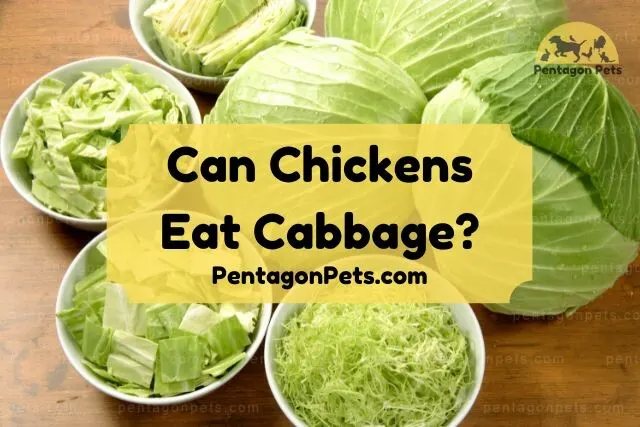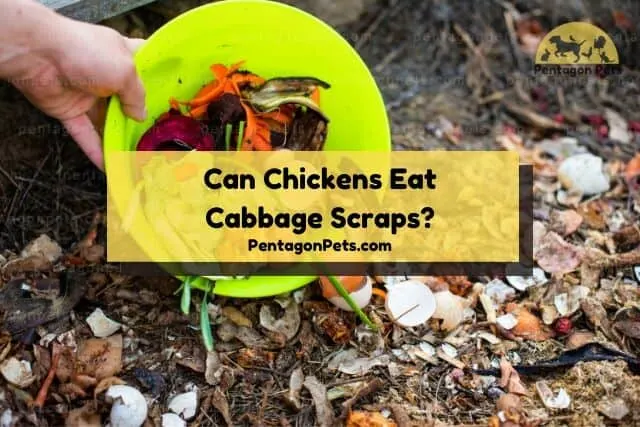Chickens are known to be omnivorous creatures, enjoying a variety of foods as part of their diet. One commonly asked question among backyard chicken keepers is whether chickens can eat cabbage. Chickens can indeed eat cabbage, which is a nutritious addition to their dietary options.
Cabbage is an excellent source of vitamins, minerals, and fiber that can contribute to a chicken’s overall health. Packed with essential nutrients like Vitamin C, Vitamin A, and Vitamin K, it can help support chicken’s immunity and vision. Furthermore, the fibrous nature of cabbage promotes good digestion and prevents chickens from overeating calorie-dense but nutrient-poor treats.

When offering cabbage to chickens, it is essential to provide it in moderation, as too much can lead to digestive problems. A balanced diet is crucial for chicken’s development, egg production, and overall well-being. Ensuring that cabbage is served in appropriate portions alongside regular chicken feed will maintain their diet’s variety and nutritional value.
Is It Safe for Chickens to Eat Cabbage?
Cabbage is a leafy green vegetable that is both safe and nutritious for chickens to consume. It contains essential nutrients, such as vitamins A, C, and K, as well as minerals like calcium and potassium, which are beneficial for the overall health of your flock.
Feeding cabbage to chickens in moderation is key. Although it is not toxic, an excessive intake of cabbage may lead to digestive issues and nutrient imbalances. It is important to ensure that your chickens have a well-rounded diet that includes a variety of fruits, vegetables, and grains to meet their nutritional requirements.
Incorporating cabbage into your chickens’ diet can be done in several ways. You can shred it and mix it with their regular feed, or hang a whole cabbage in their coop to encourage natural foraging behaviors. It is also possible to feed them cooked cabbage, but raw cabbage is easier for them to digest and retains more nutrients.
Some considerations when giving cabbage to chickens:
- Remove any spoiled or moldy leaves, as they can be harmful to their health.
- Wash the cabbage thoroughly to eliminate possible pesticides and contaminants that may be present on the surface.
- Cut the cabbage into small pieces or shreds to prevent choking hazards.
It is safe for chickens to consume cabbage in moderate amounts. This nutritious vegetable can be a healthy addition to their diet, as long as it is balanced with a variety of other foods to meet their nutritional needs.
What to Look Out for When Feeding Chickens Cabbage
Cabbage is a nutritious and fiber-rich vegetable that can be a healthy addition to your chickens’ diet. However, there are some factors to consider when offering cabbage to your flock.
Firstly, make sure to wash the cabbage thoroughly before feeding it to your chickens. Pesticides and chemicals that may be present on the leaves can pose health issues for your birds. Organic cabbage is a preferred option, as it reduces the risk of exposure to potentially harmful substances.
Secondly, it is essential to monitor the portion size when offering cabbage to your chickens. Although it is a healthy vegetable, overfeeding can lead to digestive problems and nutrient imbalances. It is best to offer cabbage as an occasional treat, in combination with a balanced diet of grains, proteins, and other essential nutrients.
Additionally, be aware of the potential choking hazard that whole cabbage leaves may present. To avoid this risk, shred or chop the cabbage into smaller pieces before offering it to your flock. This will also make it easier for your chickens to consume and digest the vegetable.
Finally, ensure that any leftover cabbage is promptly removed from the coop after feeding. Rotting cabbage can attract pests and create an unsanitary environment for your chickens, potentially causing illnesses. Regularly clean your chickens’ living space and replace any uneaten food to maintain a healthy atmosphere.
By following these guidelines, you can safely incorporate cabbage as a beneficial treat for your chickens, contributing to their overall well-being.
Can Chickens Eat Cabbage Leaves?

Chickens can indeed eat cabbage leaves. In fact, cabbage is a healthy and nutritious addition to their diet. Cabbage contains essential vitamins and minerals like Vitamin K, Vitamin C, and calcium, which promote overall health and well-being in chickens.
Feeding cabbage leaves to chickens can be advantageous in various aspects. For instance, it can help in keeping them occupied as they peck and scratch at the leaves. This activity can prevent boredom and alleviate stress in the flock, which is vital for their mental health.
However, it is crucial to ensure the cabbage leaves are fresh and clean before offering them to the chickens. Rotten or moldy leaves can be detrimental to their health, potentially causing digestive issues or other illnesses. Additionally, it is recommended to feed cabbage leaves in moderation, as excessive amounts can lead to an imbalance in their diet.
When introducing cabbage into a chicken’s diet, it is a good idea to start with small portions and gradually increase the amount depending on how well they respond. Moreover, here are a few tips for feeding cabbage leaves to chickens:
- Hang the cabbage from a string or use a cabbage holder to keep the leaves off the ground, preventing it from getting dirty or soiled.
- Chop or shred the cabbage leaves, making it easier for the chickens to eat and digest.
- Monitor the flock for any signs of discomfort or negative reactions after consuming the cabbage; this way, adjustments can be made to their diet accordingly.
Chickens can safely eat cabbage leaves, which can be a nutritious addition to their diet. Always ensure the leaves are fresh, clean, and fed in moderation to avoid any potential health issues.
Can Chickens Eat Cabbage Scraps?

Chickens can definitely eat cabbage scraps. This leafy green vegetable has numerous benefits and can be a nutritious addition to their diet. Cabbage is packed with vitamins and minerals like vitamin C, vitamin K, and calcium, which contribute to the overall health and well-being of the chickens.
When feeding cabbage scraps to chickens, it’s important to ensure that the scraps are fresh and free from mold or rot. Moldy or rotten cabbage can lead to health issues for the chickens. It’s also essential to avoid overfeeding cabbage, as it might result in an imbalanced diet. A moderate amount of cabbage scraps, combined with a balanced and varied diet, should help keep the chickens healthy and happy.
It’s worth noting that the high amounts of calcium in cabbage can be beneficial for laying hens, as it helps with eggshell production. However, the fiber content in cabbage can sometimes be hard for chickens to digest, so it’s a good idea to cut or shred the cabbage into smaller pieces to make it easier for them to consume.
One creative way to feed chickens cabbage scraps is to hang them in their coop or run. This not only provides them with a healthy snack but also offers a form of enrichment, as the chickens can peck at the hanging cabbage and keep themselves occupied.
Can Chickens Eat Cabbage Worms?

Chickens are known to have a diverse diet, and they can indeed eat a variety of insects, including cabbage worms. In fact, these worms can be a great source of protein for your chickens, which is essential for their growth and egg production.
Cabbage worms, along with other common garden pests like caterpillars and slugs, can be found on cabbage leaves. When your chickens consume these pests, they will not only obtain crucial nutrients, but they will also help control the pest population in your garden.
However, it is essential to ensure that chickens do not solely rely on cabbage worms for their nutritional needs. Chickens require a balanced diet to thrive, and this should include sufficient amounts of grains, vegetables, and other protein sources such as commercial chicken feed. Feeding chickens a varied diet will result in better health and egg production.
Moreover, it is crucial to regularly monitor your chicken’s health when consuming cabbage worms or other insects. Some insects may carry diseases or toxins that could be harmful to your flock. If you notice any signs of illness or distress in your chickens, consider reducing their access to insects or seeking advice from a qualified veterinarian.
Chickens can safely consume cabbage worms as a part of their varied diet. These worms can provide essential nutrients, help with pest control, and offer a natural food source for your flock. However, always remember to maintain a balanced diet for your chickens, and monitor their health to ensure their well-being.
Can Chickens Eat Cabbage Core?

Chickens can consume cabbage cores safely. The cabbage core is the dense, inner portion of the vegetable, and it provides a variety of essential nutrients that benefit chickens’ health. These include vitamins A, C, and K, as well as minerals such as potassium, calcium, and magnesium.
As with any other food item, moderation is key when feeding cabbage cores to chickens. While the cores are nutritious, they should not serve as a primary food source for your flock. A well-balanced diet typically consists of chicken feed, grit, and occasional healthy treats like fruits, vegetables, and insects.
Further, it’s crucial to ensure the cabbage — core or otherwise — is fresh and clean before offering it to your chickens. Any spoiled or moldy cabbage can cause digestive issues and negatively impact the health of your birds. Washing and inspecting the cabbage for signs of dirt or pests can help avoid such problems.
Lastly, an effective method to present cabbage cores to chickens is by removing the tough outer leaves and cutting the core into small, manageable pieces. Smaller pieces are easier for your chickens to consume and can help prevent choking hazards.
This article was first published on August 31, 2023 by Pentagon-Pets.
Incorporating cabbage cores into your chickens’ diet can provide them with essential nutrients and offer variety to their meals. Practice moderation and proper preparation to ensure the cores are safely consumed and enjoyed by your flock.
Can Chickens Eat Boiled Cabbage?

Chickens can eat boiled cabbage, as it provides them with a variety of nutrients and is easy to digest. Boiling cabbage softens the leaves, making it simpler for chickens to consume and process. Cabbage is packed with vitamins and minerals such as vitamin C, vitamin K, and potassium, all of which promote the overall health and well-being of chickens.
When feeding boiled cabbage to chickens, it is essential to cool it down first to avoid potential burns. Additionally, it’s important to remove any leftover seasoning or oil from the cabbage, as these ingredients might harm the chickens. Offering a moderate portion is also crucial, as overfeeding can lead to digestive issues. As a rule of thumb, cabbage should not exceed 10% of a chicken’s daily diet.
Incorporating boiled cabbage into a chicken’s diet can be done in various ways. For example, chopped cabbage may be mixed with other vegetables, grains, or poultry feed as a wholesome meal. Alternatively, leaving larger pieces of cabbage can encourage natural foraging and pecking behaviors, keeping chickens entertained and engaged.
Boiled cabbage can be a nutritious and safe addition to a chicken’s diet, provided it is fed in moderation and prepared correctly. As a treat or supplemental food, boiled cabbage can contribute to the overall health and happiness of your chickens.
Can Chickens Eat Red Cabbage?

Chickens can eat red cabbage as it is a safe and nutritious option for their diet. Rich in vitamins and minerals, red cabbage provides a variety of health benefits for chickens, such as boosting their immune system and promoting better egg production.
It is essential to introduce red cabbage to chickens gradually, as too much at once can lead to digestive problems. Begin by offering small pieces and observing their reaction. If they respond positively and continue to eat it without any adverse effects, you can gradually increase the amount.
Chickens appreciate diversity in their diet, so it’s a good idea to mix red cabbage with other vegetables and greens. Combining it with lettuce, kale, spinach, or other leafy greens offers the chickens a variety of textures and flavors, which can encourage them to eat more healthily.
In terms of preparation, red cabbage can be served either cooked or raw. Cooking it lightly may make it more palatable for some chickens and helps to break down the fibrous texture. However, avoid adding seasonings, as these can be harmful to chickens.
To summarize:
- Red cabbage is safe and nutritious for chickens
- Introduce it gradually to avoid digestive issues
- Mix it with other vegetables for a varied diet
- It can be served either raw or cooked, without seasonings
While red cabbage is a good addition to a chicken’s diet, it is important to remember that it should act as a supplement to their primary feed. Chickens require a well-balanced diet to remain healthy, and their primary source of nutrition should come from specially formulated chicken feed containing essential proteins, nutrients, and minerals. Introducing red cabbage and other vegetables should serve to augment their daily intake and provide a more diverse and enjoyable eating experience.
Can Chickens Eat Fermented Cabbage?

Fermented cabbage, also known as sauerkraut, is a popular food item known for its health benefits. Chickens can eat fermented cabbage, as it provides a source of vitamins, minerals, and probiotics. The probiotics found in fermented cabbage contribute to a healthy gut flora in chickens, thereby promoting better digestion and overall health.
However, it is essential to introduce fermented cabbage to a chicken’s diet gradually, as sudden changes in their diet can cause digestive issues. Start by offering small portions of fermented cabbage mixed with their regular feed. Monitor the chickens for any signs of discomfort or distress after introducing fermented cabbage.
It is also crucial to keep the fermented cabbage free from any contamination, such as mold or spoilage. Consuming spoiled or moldy food can be harmful to chickens and may cause illness. Ensure that the fermented cabbage is stored in a sealed container to prevent contamination, and offer it only in clean feeding dishes.
While fermented cabbage has its benefits, it should not be the primary source of nutrition for chickens. Their diet should be well-balanced and should include a variety of other foods, such as grains, vegetables, and protein sources. Offering small amounts of fermented cabbage as a treat or supplement can be beneficial, but it should not replace the essential nutrients found in a complete poultry feed.
Pentagon Pet is the owner of this article that was first published on August 31, 2023.
Chickens can enjoy fermented cabbage as part of a balanced diet. Introduce it gradually and ensure it is stored and served properly to maintain its nutritional benefits and avoid any potential harm.
Can Chickens Eat Too Much Cabbage?

Chickens can indeed eat cabbage, as it is a healthy and nutritious vegetable for them. However, like anything in a balanced diet, moderation is key. Chickens can eat too much cabbage, which may lead to potential health issues.
Feeding chickens an excessive amount of cabbage can cause them to have digestive problems, as cabbage is high in fiber. A high-fiber diet can lead to loose droppings, making their coop messy and unhygienic. Therefore, it is essential to provide a varied diet that includes other vegetables, grains, and protein sources.
Additionally, overconsumption of cabbage may result in nutrient imbalances. Chickens require a range of nutrients for optimal health, and an overly cabbage-focused diet may lack essential vitamins and minerals.
It’s also important to note that cabbage contains goitrogens, compounds that can impact thyroid function in high amounts. While the occasional cabbage treat is unlikely to harm chickens, chronic consumption may contribute to thyroid issues.
This article and its contents are owned by Pentagon Pets and was first published on August 31, 2023.
To prevent overfeeding, consider offering cabbage as an occasional treat rather than a staple food. Chopping or shredding the cabbage and mixing it with other vegetables, grains, or protein sources can help ensure your chickens get a balanced and diverse diet.
